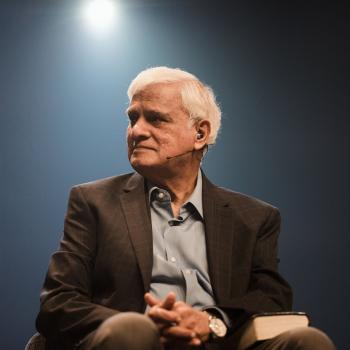I wrote a post not too long ago that caused a firestorm of controversy on social media, calling on Christians to look at the life of Ravi Zacharias as a profound warning. In it, my basic plea to people was that they consider their own ways before the Lord—that they see if there were patterns of besetting sin that would not only disqualify pastors from the pastorate, but even if the everyday layman was plagued with sins, which the apostle Paul would say that such a practice of these things would bar them from inheriting the Kingdom of God. The reason I say this caused a firestorm was that many believed I weighed in prematurely on the matter. Yet there were a great number of comments which led me to believe that many were outraged over me “touching the Lord’s anointed.” The reason I say this is that even though an investigative report has come out and Ravi Zacharias International Ministries has penned an open letter, the comments remain much the same today as they were then.
I stand by every word of that post, as I did then, believing that it is of the utmost importance that professing Christians not only take such things seriously in their own lives, but hold pastors and prominent figures within parachurch organizations to account with regard to Scripture’s own statements on these matters. In the Evangelical world, this is often an unpopular sentiment, much to the open shame of the church. We truly do need to contend with what it means for a minister to remain above reproach, lest we give reason for the unbelieving world to blaspheme. I say all of this, not as a “I told you so,” but as a means to offer up yet another plea to my fellow evangelicals, largely because I still don’t believe many take the warnings of Scripture all that seriously.
I say this in light of many continued comments surrounding what has been revealed in the gross sexual misconduct spanning multiple women over the course of multiple years, the misrepresentation of his academic credentials, and even the financial impropriety of Ravi Zacharias. Many have taken to defending Ravi Zacharias, saying things like, “It’s funny that these allegations only come when he can’t defend himself.” Others still say that we will never truly know, in spite of the evidence brought forth. Others have claimed this is the work of Satan himself, in seeking to discredit the ministry of the late apologist.
The reality is that it matters very little if he can defend himself. There’s nothing to defend. Long before his death, allegations of sexual misconduct rose against the late apologist and they were summarily dismissed, downplayed, and in some cases, simply hidden from the public’s eyes through non-disclosure agreements and hush bribes. The time for transparency came much earlier for Ravi Zacharias. The time for defending himself, or, more appropriately, confessing for the litany of allegations brought against him for ministerial misconduct, came years prior to his death. What matters is that we do have credible evidence to support the allegations brought forth—and even then some. I will agree though with the commenters who say it is Satanic, but not on account of the allegations being baseless, misconstrued, etc., simply to discredit his ministry. It is Satanic behavior. There is no way to mince words with this, and we ought not so cavalierly speak in defense of a man that should be given no defense in his actions.
What is perhaps all the more grotesque to me in people’s defense of Ravi Zacharias is that even the unbelieving world inherently knows these things are worthy of condemnation. This is something worthy of unilateral agreement—that especially ministers who purport to serve the Most High in such a public fashion—ought to have a life that mirrors their profession of faith all the more than the average individual. If the world knows this truth, how much more ought the church? The reason for this is simple, in that it is born out of the fact that ministers of the gospel are held to a higher account. Theirs is a stricter judgment (James 3:1). There’s no amount of hemming and hawing that will explain this truth away, yet time and again, the Evangelical world defends her heroes in spite of the gross immorality they have been caught red-handed in.
The broader church has repeatedly defended not only those who teach poor doctrine, but those whose lives reflect an inordinate love of money, are engaged in nefarious sexual misconduct, have proven that their character is not upright and moral, but filled with malice, fits of anger, and nearly every other manifestation of indulgence in the flesh. In other words: the broader evangelical world defends those who are not fit for ministry knowingly, excusing away the fact that they can’t meet the basic requirements of the pastorate. Time and again, they defend such men rather than stand with the Scripture’s assessment, which finds them utterly lacking. This should be a rather obvious statement that needs no utterance, but things should not be this way.
Here is particularly where I sense the most important lesson to the church comes, one which I fear many are guilty of missing and will continue to miss, simply because they won’t accept reality. The warning is that we are to take heed of such things, lest we too fall into gross misconduct and apostasy (1 Cor. 10:12). Our Lord Himself said that all things hidden will be revealed and made known to all (Lk. 8:17). Yet, rather than accept that the Lord Himself has brought these things to light in all such cases of ministerial misconduct, many within the church simply downplay it, explain it away, or reject it altogether.
In other words: they take no heed of it, and stand in the same precarious position themselves. They stand with one foot over the cliffside looking back in defense of the indefensible. They are quick to give leeway where none ought to be given—all for the sake of protecting the brand. Things should not be this way. The church’s concern ought to be all the more focused on rooting out from her midst those whose criminal behavior not only profoundly damages those within her midst, but the reputation of Christ Himself. Instead of this though, many rush to defend the indefensible yet again, or quickly affirm the profession of faith of one whose words of purported truthfulness have proven to mean very little at this time.
Whether or not Ravi Zacharias repented in his final days remains a thing to be seen. This is a thing between he and the Lord. The gospel truly is scandalous, in that even the worst offender can find forgiveness from the Lord if they are truly repentant. In the same breath, the profound warning passages of Scripture don’t give an inch, especially where we would like to take a mile. The path is narrow and few will enter (Matt. 7:13-14). Those who make a practice of sin will not inherit the Kingdom of God (Gal. 5:21). Those whose belly is their god—who live in unbridled passion of the flesh—are set for destruction (Phil. 3:19). Those who ravage the sheep of His fold shall in no way find themselves at His mercy (Jd. 1:8-16). Those who destroy God’s temple, that is, the church of the living God, will in turn be destroyed (1 Cor. 3:16-17). Yet one thing is crystal clear: even if he repented in his last days, Ravi Zacharias will have been saved only through flames (1 Cor. 3:10-14).
Regardless of that outcome, I believe people don’t learn this lesson because many don’t understand the true nature of repentance. Without a proper understanding of genuine repentance, the church will not only continue to defend the indefensible with men like Ravi Zacharias, but even within themselves. In other words, they will not come to genuine repentance, and run the risk of embodying those terrifying words of Christ in Matthew 7:21-23, “Not everyone who says to Me, ‘Lord, Lord,’ will enter the kingdom of heaven, but the one who does the will of My Father who is in heaven will enter. Many will say to Me on that day, ‘Lord, Lord, did we not prophesy in Your name, and in Your name cast out demons, and in Your name perform many miracles?’ And then I will declare to them, ‘I never knew you; leave Me, you who practice lawlessness.’”
Many often latch on to the idea of repentance being a change of mind due to the etymological definition of the Greek word μετάνοια (metanoia). While this is correct—there is an important distinction that many fail to make, in that Scripture treats the mind and the heart as one. When the Scriptures speak to the mind of the individual, it is referring to the “seat” of one’s emotions, intellect, intentions, convictions, etc. To make that more clear: it refers to the whole person, meaning repentance is not simply an intellectual exercise, but a profoundly spiritual one that encompasses the whole of one’s being. It is not a matter of just thinking differently, but a heart that reflects an earnest belief and love of this newfound truth, most notably, in a love that produces actions consistent with that truth.
The person who is truly repentant is one who will walk in repentance. They will not simply feel guilt attached to the prospect of being caught, or their sin being revealed, but they will feel a sense of godly shame and sorrow attached to their sin. They will have, as Scripture puts it, a broken spirit and a contrite heart (Ps. 51:17). They will realize they have offended a holy God in their sin and seek to turn from it in order to live a life that is pleasing to Christ, making much of His glorious gospel by seeking to walk in a worthy manner of the salvation they have been granted. Their sorrow will not be one of avoiding the earthly consequences of being caught—nor escaping the proper disciplinary action of the church as outlined in Matt. 18:15-20. Such sorrow is only the sorrow of the world, which produces death (2 Cor. 7:10).
To put it as plainly as possible, the truly repentant one will seek to fight sin rather than gratify the flesh and its desires. There will transparency rather than concealment. There will be temporal loss graciously and gratefully incurred so that they do not forfeit their heavenly reward. Yet most notably, there will be a change—a change in not only the intellect, but in the life of the believer. For some, repentance in certain areas may be as quick as the turning of a speedboat; they change course with little effort, right the ship, and take off in the opposite direction as swiftly as possible. For other, more difficult issues of repentance, it may be like the turning of an aircraft carrier. It will be slow, methodical, and clunky, but there will be a turning back in the right direction.
I say this with no pleasure, but given the vast majority of cases of pastoral and ministerial failure in the evangelical world amongst its most prominent leaders, this is more often than not, the opposite of what people have in mind. At best, people look for an expression of sorrow, yet they rarely look for a changed life as a result of such sorrow. That process takes time, great personal expense, and more. That process seeks the restitution of wrongs committed, not a concealment thereof. Yet most importantly, that process does not seek to avoid the consequences of sin—but runs to embrace them, knowing that though discipline from the Lord is unpleasant, it is a demonstration of His love, and produces a harvest of righteousness and peace for those who have been trained by it (Heb. 12:7-11).
Genuine repentance does not seek to defend one’s honor in the midst of wrong-doing. Those who understand repentance properly will not defend the indefensible. Instead, they will call people to repentance, walking them through the proper stages of church discipline, even if it means casting the unrepentant one out as an unbeliever, Christian celebrity or no. In the event that the person is no longer alive to repent or be cast out of the church, such as in the case of the late Ravi Zacharias, they will not make excuses for such behavior. They will not defend the indefensible. The reason for this is simple: they recognize that Christ’s death actually demands we do not minimize sin. The Scriptures say that if we confess our sins, He is faithful and just to forgive us our sins, and to cleanse us of all unrighteousness. That word “if” is vitally important and we do no favors to any in this world by downplaying the significance of it, especially amongst the evangelical church’s celebrity darlings.
If the church continues to downplay the seriousness of these things in favor of protecting the brand, I fear many will not only continue to excuse worse behavior than even this in their heroes, but in themselves. More clearly: if one is willing to excuse such heinous behavior in those they admire, what is to stop them from excusing it in themselves? The risks to this are life and death, especially when we consider the words of Scripture: “One who justifies the wicked and one who condemns the righteous, both of them alike are an abomination to the LORD” (Pro. 17:15).













